James Joyce (2 February 1882 – 13 January 1941) was an Irish writer and poet, widely considered to be one of the most influential writers of the 20th century. Along with Marcel Proust, F. Scott Fitzgerald and Virginia Woolf, Joyce was a key figure in the development of the modernist novel. He is best known for his landmark novel Ulysses (1922).
Joyce’s first published work was Chamber Music, a collection of poems published in May, 1907. The collection originally comprised thirty-four love poems, but two further poems (“All day I hear the noise of waters” and “I hear an army charging upon the land”) were added before publication.
One of the poems in Chamber Music was set to music by Syd Barrett. Entitled Golden Hair, it can be found on Barrett’s first (1970) album, The Madcap Laughs. Here’s an audio clip of Golden Hair, performed by Barrett:
In 2008, Fire Records released a two-disc compilation featuring all thirty-six poems set to music by some of today’s finest contemporary alternative acts, including Mercury Rev, Gravenhurst, Ed Harcourt, and Willy Mason.
Dubliners is a collection of 15 short stories, first published in 1914. The fifteen stories were meant to be Joyce’s naturalistic depiction of the Irish middle class life in and around Dublin in the early years of the 20th century.
The collection as a whole displays an overall plan, beginning with stories of youth and progressing in age to culminate in The Dead. Here’s the finale to John Huston’s The Dead:
In Dubliners, great emphasis is laid upon the specific geographic details of Dublin, details to which a reader with knowledge of the area would be able to directly relate. The multiple perspectives presented throughout the collection serve to contrast the characters in Dublin at this time.
A Portrait of the Artist as a Young Man is Joyce’s semi-autobiographical novel, first serialised in The Egoist from 1914 to 1915, and published in book form in 1916.
A Portrait of the Artist as a Young Man depicts the formative years in the life of Stephen Dedalus, a fictional alter-ego of Joyce and a pointed allusion to the consummate craftsman of Greek mythology, Daedalus.
Exiles is Joyce’s only play. It draws on The Dead, the final short story in Joyce’s first major work, Dubliners.
Although Exiles was rejected by W.B. Yeats for production by the Abbey Theatre, its first major London performance was in 1970, when Harold Pinter directed it at the Mermaid Theatre.
In 1936, Joyce wrote The Cat and the Devil, a children’s story, originally written by Joyce for his grandson. It was published in 1978.
Ulysses is Joyce’s second novel. It was first serialised in parts in the American journal The Little Review from March 1918 to December 1920, then published in its entirety by Sylvia Beach on 2 February 1922, in Paris. Considered to be one of the most important works of Modernist literature, Ulysses has been called “a demonstration and summation of the entire movement”. In 1999, the Modern Library ranked Ulysses first on its list of the 100 best English-language novels of the 20th century.
There are three versions of Ulysses, the 1922 edition:
The 1937 edition:
And the 1986 ‘corrected text’ version, which is considered controversial in that it has divided opinion as to being the best or the worst of the three versions:
Ulysses is renowned for its final chapter: Molly Bloom’s stream-of-conscious soliliquy. Here’s Part One:
And here’s Part Two:
After Ulysses came Pomes Penyeach, a collection of thirteen short poems.
Pomes Penyeach was written over a twenty-year period from 1904 to 1924, and originally published on 7 July 1927 by Shakespeare and Co. for the price of one shilling (twelve pennies) or twelve francs. The title is a play on ‘poems’ and ‘pommes’ (the French word for apples) which are here offered at ‘a penny each’ in either currency.
Finnegans Wake is Joyce’s third and final novel and a work of comic fiction, significant for its experimental style and resulting reputation as one of the most difficult works of fiction in the English language. Written in Paris over a period of seventeen years, and published in 1939, two years before the author’s death, Finnegans Wake was Joyce’s final work.
The entire novel is written in a largely idiosyncratic language, consisting of a mixture of standard English lexical items and neologistic multilingual puns and portmanteau words, which many critics believe attempts to recreate the experience of sleep and dreams.
Here’s an audio clip of James Joyce reading from his masterpiece:
Owing to the work’s expansive linguistic experiments, stream of consciousness writing style, literary allusions, free dream associations, and its abandonment of the conventions of plot and character construction, Finnegans Wake remains largely unread by the general public.
Anthony Burgess edited Finnegans Wake into A Shorter Finnegans Wake, a masterful exercise in sleight-of-hand cutting and tactful editing. It’s still not an easy read, but it does make Joyce more accessible.
In 1991, Faber and Faber (who were once champions of Joyce’s work) published Poems and Shorter Writings. This included all of the poems, the epiphanies, Giacomo Joyce and the 1904 essay, Portrait of the Artist.
If you haven’t read anything by James Joyce, then try A Portrait of the Artist as a Young Man, or even Ulysses. They’re both very good novels.
Here’s a look in R J Dent’s library at the works of James Joyce:
If you don’t fancy Joyce’s prose, you could try Chamber Music. The poems in that particular collection are ethereally delicate and beautiful, which probably means they’re worth reading, if nothing else.
Tags: A Shorter Finnegans Wake, Chamber Music, Dubliners, Exiles, Finnegans Wake, Giacomo Joyce, James Joyce, Pomes Penyeach, Portrait of the Artist, R J Dent, Stephen Hero, The Cat and the Devil, Ulysses

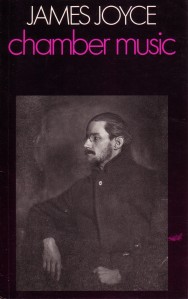






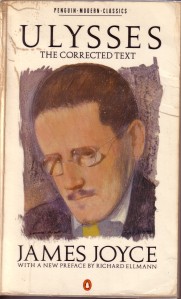


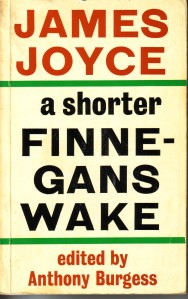
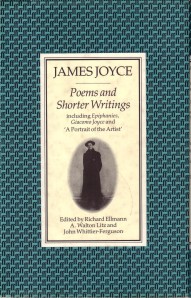
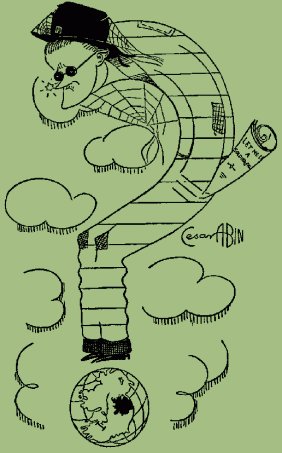
June 3, 2010 at 10:18 am |
Reminds me – I was planning to re-read ‘Ulysses’ this summer. Must shake the dust off the old copy and not forget my resolution.
Reminds me No 2: Bloomsday is approaching soon – mid-June. I have a friend who sends out Bloomsday e-cards to everyone he knows every year – always with a telling quotation from the great JJ. Must remember to send one to him and to other interested friends this year – about 2 weeks time.
June 12, 2010 at 6:30 pm |
This is a very detailed and informative post – and just in time for Bloomsday too. Nice work!
June 13, 2010 at 8:04 am |
Awesome stuff. You’ve made a really nice compilation of Joyce stuff, so thanks. You have missed off Stephen Hero, The Cat and the Devil, Giacomo Joyce and Poems and Shorter Pieces. However, the information, book covers, and film clips are all very informative, so cheers.
June 15, 2010 at 9:20 pm |
Still celebrating Bloomsday after all this time, eh. I’m not trying to undermine Joyce, but don’t you think he is over-rated? No one I know has read Finnigans Wake – nor are they going to. And I only know two people who’ve read Ulysses. I don’t know anyone whose read Exiles, or Joyce’s poetry. A few friends have read Portrait… and a few have read Dubliners. Other than that, JJ is the ‘great’ unread author. As I suggest, ‘over-rated’.
June 19, 2010 at 10:09 am |
RJ, this is a great blog about Joyce’s works. Would have been nice if you’d included a bit of Joyce’s biographical information and how it impacted on his writing, but that’s a minor quibble. Also, as someone else has pointed out, you’ve left out 3 significant Joyce books – Stephen Hero, The Cat and the Devil and Giacomo Joyce. There’s also Poems and Shorter Writings, which includes all of his limericks and epiphanies, and of course, his Letters – all very important writings. Sorry, sounds like I’m being overly-critical, when you’ve provided some valuable info on Joyce’s works.
August 26, 2010 at 8:10 pm |
Thanks for this – I didn’t know there were 3 versions of Ulysses. The Corrected Text version sounds interesting. I’ve tried the standard (1937?) version. That was okay, but I didn’t ‘get’ it. I’ll try the corrected…
September 5, 2010 at 7:24 pm |
There are three great Irish authors: Wilde, Joyce and Beckett. Wilde tried to eradicate his Irishness, by pretending to be English; Joyce celebrated his Irishness, but hated it too; Beckett tried to eradicate his Irishness by pretending to be French. Out of all of them, Joyce is the most Irish in his writing and Dubliners, Portrait, and Ulysses are the greates Irish works of fiction in the world. Ulysses is probably one of the greatest novels ever. Amazing what a bit of poverty can do to one’s creativity…
September 7, 2010 at 11:21 am |
James Joyce started out as a singer. Chamber Music was a set of songs. All of Joyce’s writing is musical – in that it has a musical soul. Ulysses is Joyce’s Irish symphony; Finnegans Wake is his circular/cyclical concerto. No one has really examined the music in Joyce’s writings. It’s good that you’ve mentioned some of it in this blog. It’s where Beckett got his music hall ideas from…
September 11, 2010 at 3:57 pm |
This article is actually the most comprehensive I’ve found on Joyce’s works. I look forward to any updates. Great set of previously unavailable covers – thanks.
September 28, 2013 at 10:12 am |
I reckon Joyce is the most over-rated author in the world. Over-hyped writing for pseudo-intellectuals – no real talent. Word games and obvious puns to disguise his linguistic poverty.
June 13, 2016 at 2:44 pm |
So James Joyce wrote children’s stories and rude limericks. Why is he taken so seriously by academics? Surely he’s less serious than Beckett.